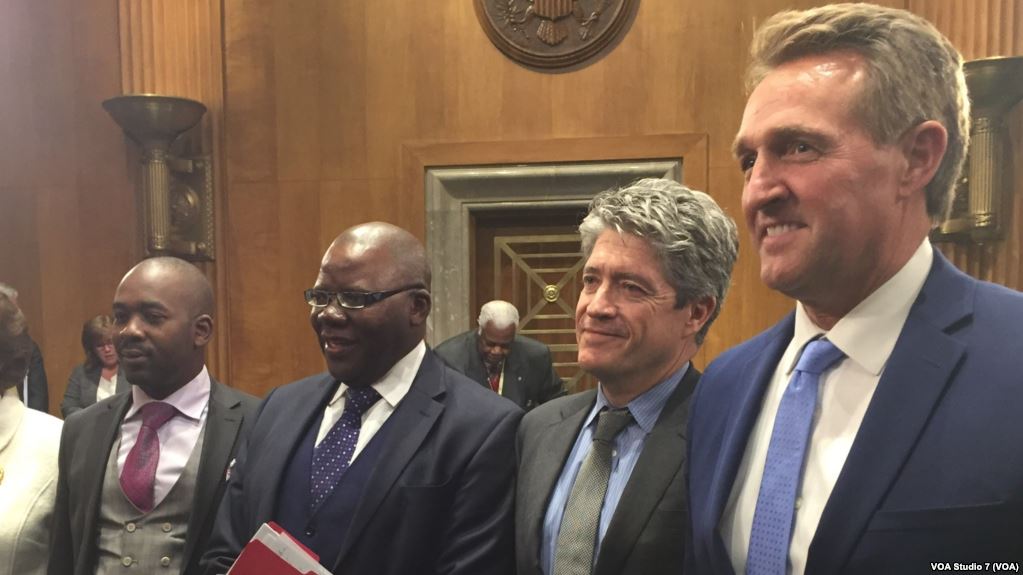by Christine Lethokuhle Mabhena
A quick search on Wikipedia, specifies that, “the Logan Act is a United States federal law that criminalizes negotiation by unauthorized persons with foreign governments having a dispute with the US. The intent behind the act is to prevent unauthorized negotiations from undermining the government's position.”
The act was passed following George Logan's unauthorized negotiations with France in 1798, and was signed into law by President John Adams on January 30, 1799.
Over the years, since the enactment of the Zimbabwe Democracy and Economic Recovery Act (ZIDERA) in 2001 by the United States of America, the act has been amended several times to make demands that infringes on Zimbabwe as an independent and sovereign state. When making those amendments, the Americans set up hearings and invite members of the opposition parties, civic society and few business persons to come and give their testimonies on why the sanctions should be maintained or repealed.
These hearings exposes the United States government’s hypocrisy as it chooses to negotiate and hear testimonies from their preferred individuals yet, they have the Logan Act that forbids its citizens from negotiating with foreign governments.
It is on these hearing platforms that several individuals have shamelessly advocated for the maintenance of the ZIDERA and/or even asked for more sanctions for the country.
On 12 December 2017, pseudo human rights activist Dewa Mavhinga, former selous scouts member Peter Godwin, MDC leaders Nelson Chamisa and Tendai Biti appeared before US Senate Committee on Foreign Relations Subcommittee on African Affairs and presented their testimonies.
Under his human rights watch banner, Mavhinga urged the US Congress to “maintain existing US policy toward Zimbabwe.” In simpler terms, thus, he persuaded the US government to maintain the sanctions on Zimbabwe.
On the other hand, Mr Biti submitted that, “we ask the international community and the U.S. to keep us in your hearts. Do not allow our country to be forgotten in our battle against tyranny and poverty and for democracy and human rights. Our election requires active support and oversight from the international community, including our American friends.”
Based on the inputs from Biti and Mavhinga testimonies, on 25 July, ahead of the 2018 elections, the US Congress and Senate passed the amended ZIDERA. Just over a week after the 2018 election, US President Donald Trump signed the amended ZIDERA of 2018 (S 2779) into law, effectively extending US sanctions against Zimbabwe.
Fast forward to last week, the US Senate Foreign Relations Sub-Committee on Africa and Global Health, again heard testimonies from local business leader, Mr Joe Mutizwa and a one Todd J Moss.
In his testimony, Mr Moss said, “the United States should be extremely cautious in its re-engagement with the government of Zimbabwe. It is far too early for the United States or other international creditors to give the government any benefit of the doubt on economic reform or to provide debt relief or new loans.”
One of the sub-committee convenors, US Senator Jeff Flake unashamedly claimed that, “the name of Tendai Biti has been raised a number of times. It would be difficult for the US to move forward with any type of relationship with Zimbabwe while charges are still levelled against him. He is a friend of this committee”.
It cannot be ruled out that Mr Biti could have contacted Mr Flake clandestinely to make the demand that he should be released without charge.
These individual testimonies have had a detrimental effect on the country’s re-engagement efforts.
With the ushering in of the new dispensation, President Mnangagwa has been advocating for the re-engagement with the rest of the world, after noting that for the country to achieve more economic growth, it needs other countries by way of mutual cooperation.
Moving forward, the country needs to act against these selfish individuals dampening the hopes of re-engagement with the US.
The time is now to enact our own “Logan Act.”
It is imperative that the current crop of our legislators urgently craft our own laws to deal with future re-engagement saboteurs that have been calling for more sanctions on our country, just for a few pieces of silver.




